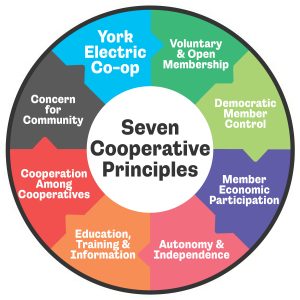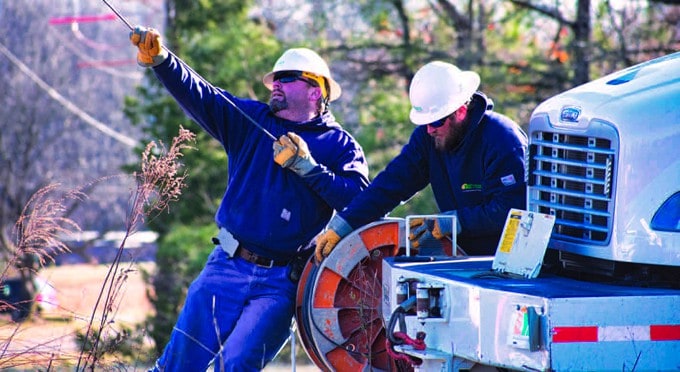Seven Cooperative Principles
 Seven bedrock principles guide cooperatives worldwide, all based on a set of values adopted by the International Co-operative Alliance and governing the spirit in which cooperatives operate. The roots of these principles can be traced to the first modern cooperative – the Rochdale Equitable Pioneers Cooperative, founded in Rochdale, England in 1844 by a group of tradesmen marginalized by the automation of the Industrial Revolution who set out to control the selling of their own consumer goods. These principles are a key reason that America’s electric cooperatives operate differently from other electric utilities, putting the needs of their members first.
Seven bedrock principles guide cooperatives worldwide, all based on a set of values adopted by the International Co-operative Alliance and governing the spirit in which cooperatives operate. The roots of these principles can be traced to the first modern cooperative – the Rochdale Equitable Pioneers Cooperative, founded in Rochdale, England in 1844 by a group of tradesmen marginalized by the automation of the Industrial Revolution who set out to control the selling of their own consumer goods. These principles are a key reason that America’s electric cooperatives operate differently from other electric utilities, putting the needs of their members first.
Cooperative Principles
Voluntary and Open Membership
Membership in a cooperative is open to all people who can reasonably use its services and stand willing to accept the responsibilities of membership, regardless of race, religion, gender, or economic circumstances.
YEC is one of 20 member-owned electric cooperatives in South Carolina. Founded in 1941, we now provide electricity to over 67,000 members in York, Lancaster, Chester, and Cherokee counties.

Democratic Member Control
As member-owners of an electric cooperative, the members control the co-op by approving bylaws that govern the business structure and by electing qualified members locally to serve on the co-op’s Board of Directors. Each member is entitled to one vote on all matters pertaining to membership, regardless of the amount of electricity they purchase.
YEC holds an Annual Business Meeting each year, where members have the opportunity to approve or disapprove bylaws and cast votes for Board Members when an election takes place.
Member’s Economic Participation
In an electric cooperative business, the member-owner’s patronage is an integral part of the business assets and financing. As a member of a co-op, members have an obligation to utilize the co-op’s services. This obligation and the rates they pay for service help to finance the cost of building, maintaining, and operating the utility.
Since the sole purpose of an electric co-op is to provide service without generating excessive margins, the co-op sets rates that will enable it to pay all operating and financing expenses. Any net income remaining after expenses is refunded to the members or credited to their accounts based on the amount of electricity they use in a given year. This net margin is called member equity.
As a not-for-profit utility, York Electric later returns these revenues to the members who originally paid them in their electric bills. Each year, our members receive Capital Credit checks. The amount of Capital Credits returned is determined by total revenues received over expenses for the co-op and your total energy billings for the year. They are paid periodically with board approval after review of YEC’s financial status.
Autonomy and Independence
As a member organization, an electric co-op is a private business that is chartered under its respective state business statutes. The member-elected Board provides local leadership, sets business policies, approves operating budgets and rates charged for services, and directs the co-op’s planning through a manager. The manager is hired by and reports to the Board. The manager supervises and coordinates the day-to-day business operations by managing Board-approved service work plans, people, capital, and physical resources.
YEC is governed by a Board of Trustees, a group of local people with the same needs, concerns and perspective as their fellow cooperative members. There are no shares or stockholders or investments to be looked after, only the good of all the people who make up the YEC family. Best of all, these board members are only beholden to you and your interests because they are elected by you, the member.

Education, Training and Information
As a member-controlled business, the bylaws require the board and management report to the membership about the co-op’s plans and operations. The co-op uses several methods to do this, including meetings, surveys, mailings, newsletters, and magazines.
Directors and managers must constantly keep themselves updated on the latest developments in financing strategies, laws, regulations, and technological changes that have an impact on the co-op. Employees, who are truly among the co-op’s most valuable operating assets, are well trained to work safely and informed about new technology and member needs and wants.
YEC cares about keeping our employees safe and informed, but we also care about our members too. Your co-op puts a lot of energy into educating the public about electricity. We regularly offer safety demonstrations to students and other groups throughout our service area in an effort to teach important safety lessons to the participants.
Cooperation Among Cooperatives
Electric co-ops represent the largest electric network in the U.S, covering three-fourths of the nation and serving more than 31 million consumers. To supply their energy needs, many co-ops have banded together to form generation and transmission co-ops that produce or aggregate the purchase and delivery of electric energy from reliable sources, to ensure the co-ops can meet the needs of their consumers.
Other national cooperative organizations, such as the National Rural Electric Cooperative Association (NRECA) and the National Rural Utilities Cooperative Finance Corporation (CFC) have been formed by the nation’s individual co-ops. NRECA serves as an advocate for the co-op way of doing business, while CFC helps finance the need to continually upgrade and expand services to meet customers’ growing needs.
Electric co-ops have also formed supply co-ops, to guarantee the best prices on supplies and equipment; statewide associations, which provide a variety of services, from safety training to legislative activities; and other federations to provide co-ops with insurance and other services designed to meet a co-op’s distinct needs at reasonable prices.
YEC is part of the Electric Cooperatives of South Carolina (ECSC). When other co-ops’ service territories suffer from large scale outages, YEC will often send crews to assist in making repairs and restoring power.
Likewise, YEC has received help from other local electric co-op in times of need. We are always looking out for you!

Concern for Community
Electric co-ops are local people helping people. The directors represent local member-customers. The management and employees are locally based. Therefore, electric co-ops have an inherent concern for their neighbors. Whatever affects the electric co-op consumer also affects the directors and employees who live and work next door.
That’s why three-fourths of America’s electric co-ops are actively involved in some type of community development activities. Co-ops throughout the country provide services to their communities that range from installing lights at local athletic fields to donating satellite dish systems to schools to provide for distance learning opportunities.
For cooperatives, one of the most important roles to fill is that of a good neighbor.
YEC takes Concern for Community very seriously. That’s why we offer a variety of community programs, like Operation Round Up and the Burrell Foundation, to name a few. We also offer local students scholarships and trips, local teachers Bright Ideas grants, and provide safety demonstrations at local schools. Additionally, YEC sponsors and participates in numerous community events each year, like our annual Shred Day or Hot Dogs for Heroes event. We are always looking for new ways to give back to our communities and improve the quality of life in our local areas.
